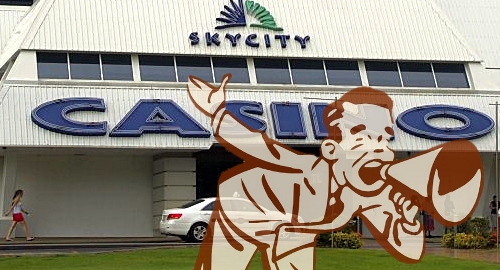 New Zealand and Australian casino operator SkyCity Entertainment Group is looking to sell its Darwin casino as part of its new ‘asset-lighter’ strategy.
New Zealand and Australian casino operator SkyCity Entertainment Group is looking to sell its Darwin casino as part of its new ‘asset-lighter’ strategy.
On Tuesday, SkyCity made its annual investor day presentation from its Auckland headquarters, during which it doubled down on its commitment to keep raining down dividends on shareholders, despite having committed over NZ$1b (US$725m) to development projects.
These costs include A$330m to breathe some life in its struggling Adelaide casino, plus another NZ$700m for a hotel/convention center expansion of its flagship Auckland property. The company has also pledged to boost the pay of roughly half its 4k New Zealand staffers to NZ$20 per hour by 2020.
In order to free up cash to keep its commitment to return 80% of net profit after tax to shareholders, SkyCity has enlisted investment bankers Goldman Sachs to drum up interest among “selected parties” in its Darwin casino, on which the company recognized an A$95m non-cash impairment last summer due to “increased competitive pressures in the gaming machine business.”
The Darwin property accounted for 12% of the SkyCity’s FY17 group revenue and 8% of earnings (excluding the “international business’ of Asian VIP gamblers). SkyCity holds an exclusive license on the Darwin casino market until 2036.
Analysts have pegged the property’s value at between A$200m and A$250m, although the question remains who might be interested in the property.
Neither of Australia’s two main casino operators – Crown Resorts and The Star Entertainment Group – is believed to be seriously considering a bid for the Darwin venue. Crown is dealing with its own retrenchment issues and ongoing question marks regarding the mental health of majority shareholder James Packer, while The Star has its hands full with its ambitious Brisbane joint venture.
That leaves open the possibility that a foreign investor will seek to take the Darwin property off SkyCity’s hands as a way of making inroads into the market. Malaysian casino giant Genting had previously held a stake in The Star (back in its previous incarnation as Echo Entertainment) but found regulatory resistance to increasing that stake and eventually sold out last summer.
Moreover, Australian legislators and regulators haven’t been making life easy for the nation’s gaming industry in recent years, and every day seems to bring threats of further restrictions. Still, there’s nothing like a company positively screaming ‘motivated seller,’ so don’t write off those Goldman Sachs boys just yet.